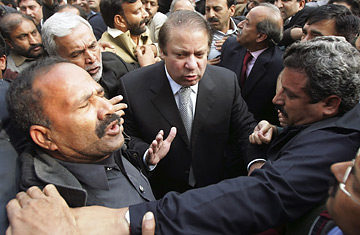
Former Pakistani Prime Minister Nawaz Sharif, center, makes his way through a crowd of supporters to the entrance of the residence of Pakistan's deposed Chief Justice Iftikhar Mohammed Chaudhry, in Islamabad, Pakistan, December 6, 2007.
Former Pakistani Prime Minister Nawaz Sharif tried — and, as expected, failed — to get past a line of some 300 riot policemen in Islamabad on Thursday. In what may be a pre-election publicity stunt, Sharif had been trying to visit the deposed Supreme Court Chief Justice Iftikhar Chaudhry, who has been held under house arrest since President Pervez Musharraf instituted emergency rule on November 3. While hundreds of supporters chanted his name, police turned Sharif back at the concrete and barbed wire barricades. Undeterred, he addressed the crowd, saying, "I have come here to express solidarity with the Chief Justice and other judges. I want to tell them that the entire nation stands by them. We will not rest until all these judges are restored to their pre-November 3 positions." The crowd cheered, and pelted a nearby poster of Pakistani President Pervez Musharraf with their shoes — a vulgar insult in Pakistan.
Sharif's astute display of political theatre presages many more to come in the run-up to parliamentary elections slated for January 8. Few in Pakistan expect the poll to be either free or fair: Emergency rule will not be lifted until December 16, leaving candidates little more than three weeks of campaigning; several provincial candidates may have to campaign while under house arrest; and Sharif himself has been barred from running for Prime Minister. Rumors abound of electoral rigging, ballot stuffing and vote-buying. Given the fraught campaigning atmosphere, candidates are struggling to get the public's attention. Highly publicized discussions between Sharif's Pakistan Muslim League-Nawaz party and former Prime Minister Benazir Bhutto's Pakistan People's Party about a controversial call for a cross-party election boycott substitute for any kind of formalized debate. Boycotting the elections could destabilize the country, but many candidates fear that participating will legitimize the decision by Musharraf to declare emergency rule when it appeared as if the Supreme Court, which he has since replaced, would rule him ineligible for the presidency.
The boycott debate centers around Pakistan's Judiciary. When Musharraf declared emergency rule, he dismissed the Supreme Court and forced both high court and Supreme Court justices to sign an oath of allegiance. Those that refused to sign were placed under house arrest. Sharif maintains that all parties should boycott elections unless the judiciary sacked by Musharraf is reinstated; Bhutto simply demands a restoration of the constitution and a lifting of emergency rule, saying the reinstatement of the judiciary should be left to the new parliament. Bhutto, like Musharraf, has a vested interest in a more compliant judiciary: Chief Justice Chaudhry, after all, had agreed to hear a case brought against Musharraf's controversial amnesty ordinance absolving Bhutto of past corruption charges as part of a now-defunct power-sharing deal between them. Were the original Supreme Court to be reinstated, Bhutto risks the reopening of a prickly case that could jeopardize her prime-ministerial ambitions.
Sharif, who has also been charged with corruption, was exempted from Musharraf's amnesty offer, so he has nothing to lose by supporting Chaudhry's reinstatement. Musharraf had earlier attempted to oust Chaudhry in March, but was forced to back down in the face of nationwide protests. Since then, the independent-minded judge has been at the forefront of Pakistan's only genuine grassroots political movement in the past few decades. Its demand for the rule of law and an independent judiciary transcends party lines, and if Sharif can tap the Chief Justice's movement, his party stands a better chance at the polls — even if the electoral commission has ruled him ineligible to become Prime Minister because of a conviction for hijacking related to events during the coup that brought Musharraf to power in 1999.
While boycotting the elections is still an option for Bhutto, she looks set to participate, knowing that Sharif will have no choice but to follow her lead — boycotting may give him the moral high ground, but his party would lose power. And that explains today's theatrics in front of the Chief Justice's house. Bhutto made a similar move last week. Both candidates will wave the boycott card until the very last minute, in a game of political poker that will end on December 15, the deadline for candidates to enter the race. Still, it's Musharraf who holds the trump card. The emergency, he says, will be lifted on December 16, but he could prolong it if the parties do decide to boycott the election. He appears to be betting that power will be more important than principle to both Sharif and Bhutto.
